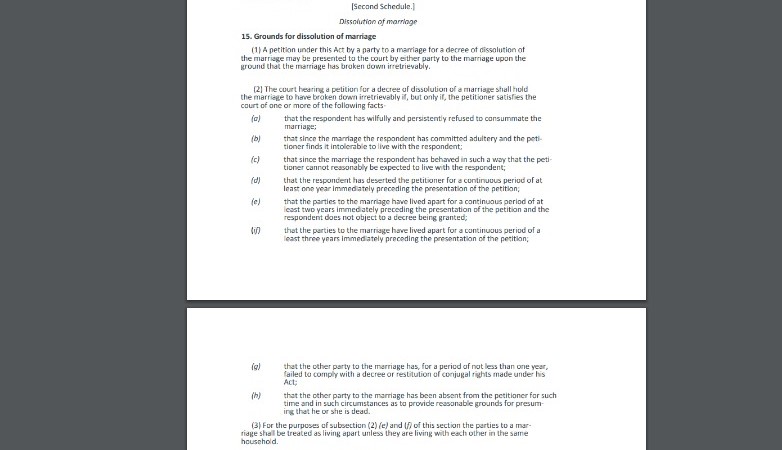How to get a divorce in Nigeria: One modern trend which isn’t what should be a trend is the issue of divorce. But as bad as it may sound in some or perhaps most cases, it is necessary to get a divorce to avoid quitting happiness for life as a result of being tied down to a drowning relationship which practically isn’t going anyway near right nor looking to get change for the better in the nearest future.
But getting a divorce is a legal procedure applicable only to legally wedded couples, so if you are not legally married to your partner, all you need do is just take a break and walk away or walk out of it (the relationship) and move on.
Wait a minute, I didn’t give you the meaning of divorce. Divorce is a simple term for “Dissolution of marriage”, practically sounds like dissolution of partnership” right? Which is what it is actually because divorce is the process of terminating a marriage or marital union – ACCORDING TO WIKIPEDIA, I prefer to use the initial definition which is “dissolution of marriage” because it sounds like the dissolution of a partnership.
Have you ever wondered why you and your other half or soul mate are called partners?
It is because you both entered into a life partnership contract and bringing this contract (marriage) to an end is DIVORCE.
Divorce in Nigeria
Like any other country of the world, Nigeria has its procedures for getting a divorce. These procedures could take time, money and even disrupt your personal schedule as you might be needed in due processes as the court may require, so, going for a divorce is like taking a taking up a task. Nevertheless, I will be putting you through on how to get a divorce in Nigeria.
After research which took me days but was successfully completed, I arrived at this legal proceedings and order at which cases pertaining to or concerning the process of divorce are handled in Nigeria.
If you are to really consider divorce as your option of dispute resolution, then the procedures below are detailed to put you through the process of getting a divorce in Nigeria.
1. Consulting a lawyer
In every legal case, the first step is having legal personnel or a lawyer to help in persecuting or defending you. So, the first and most important step towards filing a divorce and getting a divorce in Nigeria is getting a lawyer, not just a lawyer but one who is an expert in dispute resolution specifically in family and marriage issues.
This is the first process you have to get started with.
Under the “Nigerian divorce law”, a lawyer has to represent you in court in order to bring your case for divorce before the court after which proceedings shall take effect according to the stated legal proceeding pertaining to divorce in the Nigeria law just as in other counties of the world.
2. Grounds for divorce
The Nigerian divorce is under the statutory law of Nigeria which is governed by the provision for the Matrimonial Causes Act CAP 220 LFN 1990. And under this Act stated above, that is statutory marriage as opposed to customary or Islamic marriage can only and will only be dissolved or divorced on the ground that the marriage dispute is beyond settlement, that is, it has broken down beyond recovery or it is irretrievable.
But have this at the back of your mind, that your marriage must have been at least 2 years old, and if it is not then you would be advised to take another action for resolution known as “annulment”.
Now, back to the Act CAP 220 LFN 1990, section 15(2) of the Act states that grounds upon which a marriage may be dissolved.
The court hearing a petition for the decree of dissolution of a marriage shall hold the marriage to have been broken irretrievably, if, but only if the petitioner satisfies the court of one or more of the following facts:
- That the respondent has willfully and persistently refused to consummate the marriage.
(A party is said to have willfully and persistently refused to consummate a marriage when he or she deliberately refuses to have sexual intercourse with the other party despite a number of requests.) The Petitioner must satisfy the Court that no consummation has taken place before the commencement of the hearing of the Petition.
- That since the marriage, the respondent has committed adultery (adultery is having sexual affairs with a third part who you are not married to), and the petitioner finds it intolerable to live with the respondent.
- That since the marriage, the respondent has behaved in such a way that the petitioner cannot reasonably be expected to live with the respondent
(Section 16 MCA provides circumstances that can fall under the fact. Example rape, sodomy, bestiality, drunkenness, going in and out of jail etc. Note that cruelty falls under the ground too). - The respondent has deserted the petitioner for a continuous period of at least one year, immediately preceding the presentation of the petition;
(Desertion means living apart with the intention to bring to an end all rights and duties of marriage.
Living apart with the consent of the other party does not amount to desertion. Note that such consent can be withdrawn and upon withdrawal of consent, the period for purpose of desertion begins to count.
There is willful and constructive desertion. In wilful desertion, the person that left is in desertion while in constructive desertion, the person in the house is in desertion (by conduct causing the other party to live apart).
- That the parties to the marriage have lived apart for a continuous period of at least two years, immediately preceding the presentation of the petition and the Respondent does not object to a decree being granted.
- That the parties to the marriage have lived apart for a continuous period of at least three years, immediately preceding the presentation of the petition.
(Living apart as envisaged by the ground does not connote physical living apart of the parties to the marriage. There must be evidence of definite termination of the consortium between the parties to the marriage before the physical fact of being apart can be said to constitute separation).
- That the other party to the marriage, has for a period not less than one year, failed to comply with a decree of restitution of conjugal rights made under the Decree.
(The main ground here is that the Respondent has failed to resume cohabitation with the Petitioner in compliance with a court order to that effect. The Respondent must also not have been cohabiting at the time of the presentation of the petition).
- That the other party to the marriage has been absent from the petitioner for such time, and in such circumstances, as to provide reasonable grounds for presuming that he or she is dead.
(Under the Evidence Act, a person must be absent for 7 years for such person to be presumed dead. Section 164(1) EA, 2011, Section 16(2) (a) MCA)
Once any or more of the above stated has been established by the petitioner then a case of divorce can be established and other necessary procedures can the follow.
All is set and structured for divorcing action to kick off without any hurdles, but remember to put some key things into consideration before executing the divorce process so neither of you get to suffer loss a result of the divorce and to also avoid incurring liabilities alone rather than sharing the burden.
Some of these things to take into consideration are:
- Who will take custody of the child/children (if any)?
- How will the maintenance of the children be paid or shared?
- Are you entitled to any share of any property?
Having asked yourself/yourselves these questions and consulted with your lawyer who should make this critical analysis easier and concluded on what and how you are going negotiating these considerations into the divorce process which will be legally proved or done by your lawyer.
You can read more on the grounds of dissolution of marriage by checking the Matrimonial Causes Act
Now, you can then start your divorce process.
Divorce Process
On no occasion shall any divorce process be carried out without the application of the petition section 54(1) MCA. So, it will commence by petition section 54(1) MCA. The petitioner or the party filing for the divorce begins or initiates matrimonial proceedings by a “petition” as stated above.
And this shall be the content of the petition:
• Petition or suit number.
• Parties and status.
• Full names, occupation, and address of each of the party to the proceeding. Name of the wife immediately before marriage.
• Particulars of the marriage.
• Particulars of birth of the parties to the marriage.
• Particulars relating to domicile or residents of the marriage in Nigeria.
• Particulars of cohabitation of the parties to the marriage and its ceasing.
• Particulars of children of the parties to the marriage and the children of either party to the marriage.
• Particulars of previous proceedings between the parties to the marriage, if applicable
• Facts relied upon but not evidence by which the facts are to be proved. Facts to support the ground.
• Condonation, connivance and collusion.
• Proposed arrangement for children.
• Custody.
• Maintenance and settlement of property.
• Reliefs being sought
• Address for service on Respondent.
On receiving the petitioner filed by the petitioner, the respondent or defendant can also in his own discretion decide to file an answer to the petition. Just like law of contract, after an offer has been made across offer or counteroffer can also be made. So, same applies here when the petitioner decides to reply and the respondent cross-petitions which now will be in the form of another petitioner after which trial may commence
While a case has been established and processing has begun, there will be required papers or document which will be required by the court and your lawyer is tasked with getting these papers ready.
Divorce papers
• Notice of petition.
• Petition for the dissolution of marriage.
• Verifying affidavit.
• Certificate relating to reconciliation signed by the legal practitioner.
• Acknowledgement of service.
Original Marriage Certificate. By Section 32 of the Marriage Act which states: where the original marriage certificate is lost, a duly certified true copy thereof or entry in a marriage book and a certified true copy of such copy could be tendered in evidence.
• Discretion statement
This statement is required to be filed where a party to the proceedings has committed adultery either before the filing of the petition or answer but before the trial of the proceedings.
Legal factors to be considered during the divorce process
Apart from personal consideration, another thing to put some energy of thought into is the legal considerations which are very crucial. Stated below are the legal consideration to be noted.
1. Jurisdiction
The only court with the jurisdiction as regarding every divorce procedure in Nigeria is the High Court of any state of the federation. However, where the High Court of a State makes an order for maintenance, the order can be enforced in a court of summary jurisdiction in a summary manner. Thus the Magistrate Court being a court of summary jurisdiction can enforce such order of maintenance, subject to its jurisdictional
limit.
There is a single jurisdiction for the High Court as any High Court of any state of the federation can exercise jurisdiction irrespective of where the parties to the proceedings are domiciled. Thus for the purpose of matrimonial causes, there is only one domicile, which is Nigeria, notwithstanding that the parties being domicile in different states.
However, section 9(2) of the MCA provides that for the transfer of any matrimonial proceedings in a court where it was commenced to another Court on the ground that the first Court is not convenient for the parties and the latter is more convenient.
2. Domicile
Domicile in one word is the permanent home of a person. The general rule is that it is the domicile of the petitioner that confers jurisdiction on the High Court of a state for the purpose of hearing matrimonial proceedings. The petitioner must be domiciled in Nigeria before the court can have jurisdiction. Section 2(3) MCA.
In one of our write-ups, we fully discussed how a deserted wife can file for a divorce in Nigeria.
There are three types of domicile:
a) Domicile of origin,
b) Domicile of choice
c) Domicile of dependence.
Domicile of choice is the domicile taken by a person upon attaining majority. In this like, one must be resident in that country permanently or indefinite period and an intention to so remain. That is the animus.
Domicile of dependence is a domicile given to person’s dependent on others e.g. a child, wife, etc. thus the domicile of a wife follows that of the husband. Upon marriage, the wife takes the domicile of her husband.
If the husband changes his domicile, the wife¡¯s domicile automatically changes. Hence, before a wife can bring matrimonial proceedings in Nigeria, she must be domiciled in Nigeria, that is, her husband must be domiciled in Nigeria.
However, because of the injustice that is likely to be done to a deserted wife in Nigeria whose husband may have changed his domicile, special domicile for the purposes of matrimonial proceedings before the Nigerian court was created for any deserted wife under the Section 7(a) &(b) MCA.
Thus where the wife was domiciled in Nigeria either immediately before her marriage or immediately before the desertion, she shall be deemed domiciled in Nigeria ¨C Section 7(b) MCA. Also, where at the date of instituting the proceeding, she has been resident in Nigeria for at least 3 years before instituting the matrimonial proceeding, she shall be deemed to be domiciled in Nigeria ¨C Section 7(b) MCA. The special domicile
so created is only for the purpose of the matrimonial proceeding, thus limited.
Divorce Certificate
At the end of all legal procedures and finally, divorce is granted, the court will issue a divorce certificate to both parties. The court may grant a decree of dissolution of marriage and this decree comes in two forms which are:
• Decree Nisi
• Decree Absolute
On a final note, getting a divorce in Nigeria is as rigid as amending the constitution, but when you are finally granted one please do well to make sure you don’t end up in another prison of discomfort.






No Comments